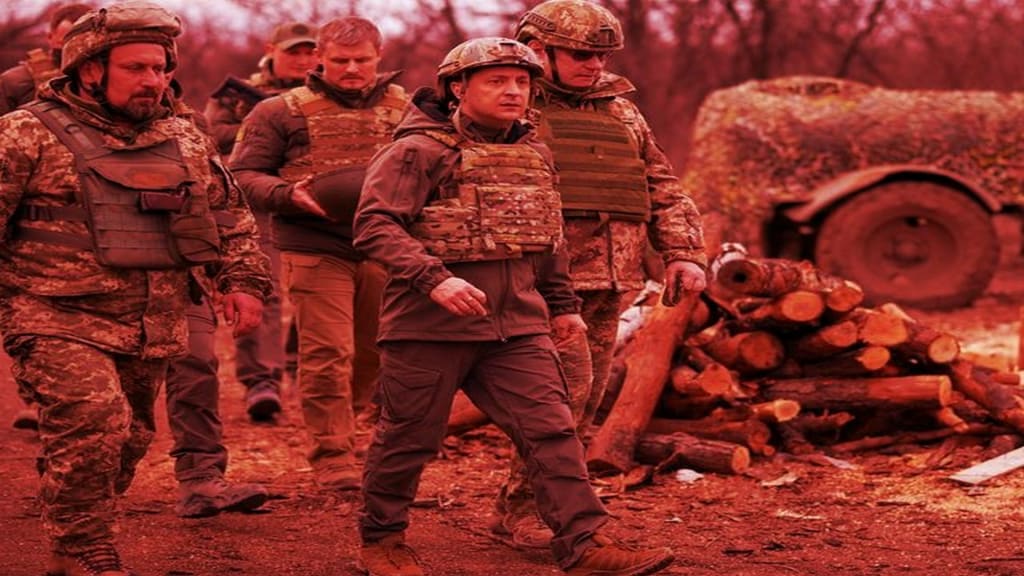The Ukraine conflict exposes the US's power constraints
The United States of America is still a superpower. But, when it comes to Russia, the US isn't all-powerful.

Ukraine's sovereignty and international law have been breached by Russia. The US response has been economic: the United States has imposed the strongest sanctions against Russia in history, but they are unlikely to change the form of Russian President Vladimir Putin's hostility.
So, what should we make of the United States as a superpower in 2022?
It's too soon to draw sweeping judgments about what the war in Eastern Europe means for America's global destiny. However, there are enough hints to suggest that America's influence is limited, as it has always been. With the fall of the Soviet Union, the United States gained worldwide dominance for a brief while. Then-President George W. Bush squandered it by waging costly (and dangerous) regime-change wars. Following presidents lied to the American people about progress in the Middle East during two wars that killed hundreds of thousands of people. Despite all of these unforced blunders, the US remains a superpower, despite the fact that the limits of non-military dominance have been exposed.
The "caricature" of America as a superpower, according to Thomas Pickering, who served as ambassador to Russia from 1993 to 1996, has distorted the way most Americans think about how the world works.
Pickering observed America's global position alter over four decades as a professional diplomat, from the Cold War through the fall of the Soviet Union to the peak of US domination at the turn of the millennium. "If you believe that a superpower can do whatever it wants, anywhere, at any time, without experiencing the costs of risk and uncertainty," he told me, “Then you have misperceived the current international scenario."
A superpower isn't invincible or all-powerful. Although the US would not send troops to Ukraine, it has sent hundreds of millions of dollars in armaments, led an international coalition to impose broad economic penalties, and urged internet companies and global organizations such as FIFA and the Olympics to pursue Russia's cultural isolation. Despite having the world's largest military and the strongest economy, the US has been unable to persuade Russia to choose a different route. As a result, Putin's army continues to move closer to Kyiv. And it does not appear that America has the power to prevent the assault without risking nuclear war.
Superpowers must choose their battles and make the same difficult decisions as any other country, especially when confronted with a nuclear-armed enemy like Russia. Many Americans have internalized the shibboleths that the US has never lost a war and that the US never compromises with foes, especially during a battle, rather than appreciating the complexity of world events. Neither of these statements is correct.
Both of these issues demonstrate that the United States has failed to realize its own limitations, some of which have been for a long time and are simply exacerbated by Russian aggressiveness.
How the unipolar era came to an end
When the Cold War ended in the ’90s, the United States possessed unrivaled economic and military power. Former Secretary of State Madeleine Albright argued the primacy of American exceptionalism in her phrase, "the indispensable nation," while scholar Francis Fukuyama claimed the "End of History."
Some say the unipolar moment was exaggerated. "Look, after the fall of the Soviet Union, the Americans suffered from hubris," said Joseph Nye, a Harvard academic who has written extensively on American dominance. "I believe the unipolar moment was always false."
At the end of the Cold War, the United States continued to portray itself as a security guarantor. According to Stephen Wertheim, a historian of US foreign policy at the Carnegie Endowment for International Peace, "The United States established itself as accountable for peace, security, and democracy in Europe." The United States took military action against Serbia through NATO in reaction to ethnic cleansing in Bosnia. The intervention was modest in scope, but it resulted in a successful projection of US power.
But, whether actual or imagined, that unilateral moment was fleeting.
According to Wertheim, the terrorist acts of September 11, 2001, did not pose a threat to global supremacy. Rather, it was America's response's 20 years of calamitous overreach. The invasions of Iraq and Afghanistan revealed the US's power limitations.
It's possible that Osama bin Laden understood something about Americans that they didn't, namely that in the aftermath of horrible terror strikes, the United States would overreact. With the invasion and occupation of two countries, the United States would confront two decades of repercussions that would tear the country apart and damage democratic norms at home and abroad. "Basically, we bit off more than we could chew with the Iraq war, and we got our comeuppance," Nye added.
Mired in the Middle East and Afghanistan, the United States proceeded to expand its role as a global policeman through a network of US bases and military commitments that, counterintuitively, reduced US strength. China began to emerge as a counterbalancing force during this time, and Russia reemerged as a European power.
"As the problems with the wars in Iraq and Afghanistan become more apparent, we begin to see a progressive erosion in belief in the United States' ability to transform other societies," Wertheim added. "One issue is that as a result of this, we have made pledges to Ukraine." That means that if we don't follow through on our obligations, we lose prestige."
Now that the United States is on the verge of a nuclear war with a nuclear superpower, it is evident that the de-emphasis on arms control and nuclear disarmament has been one of the most significant failures of recent years. President Barack Obama, who was an outspoken anti-nuclear activist in his youth, negotiated a new START Treaty in 2011, which limits and monitors nuclear weapons between the US and Russia. This has now been extended until 2026, but more is still required. Over the course of decades, Washington and Moscow have allowed the arms control regime to deteriorate, culminating in President Donald Trump's departure from the 1987 Intermediate-Range Nuclear Forces Treaty.
"Slowly, the structures that kept US-Russian military competition visible and predictable went away," New America's Heather Hurlburt stated. "At the same time, Beijing," a nuclear state, "is beefing up its arsenal and stating unequivocally that it is not interested in the US-Soviet arms limitation arrangement."
Other global catastrophes, such as covid, have highlighted the United States' inability to lead as an indispensable nation.
About the Creator
Anirban Bose
Hello,
My name is Anirban, and I'm from India. I'm an E-Book and article writer with plenty of expertise. Article writing, E-Book writing, report writing, academic writing, blogposts, and social media posts are among my specialties.






Comments
There are no comments for this story
Be the first to respond and start the conversation.